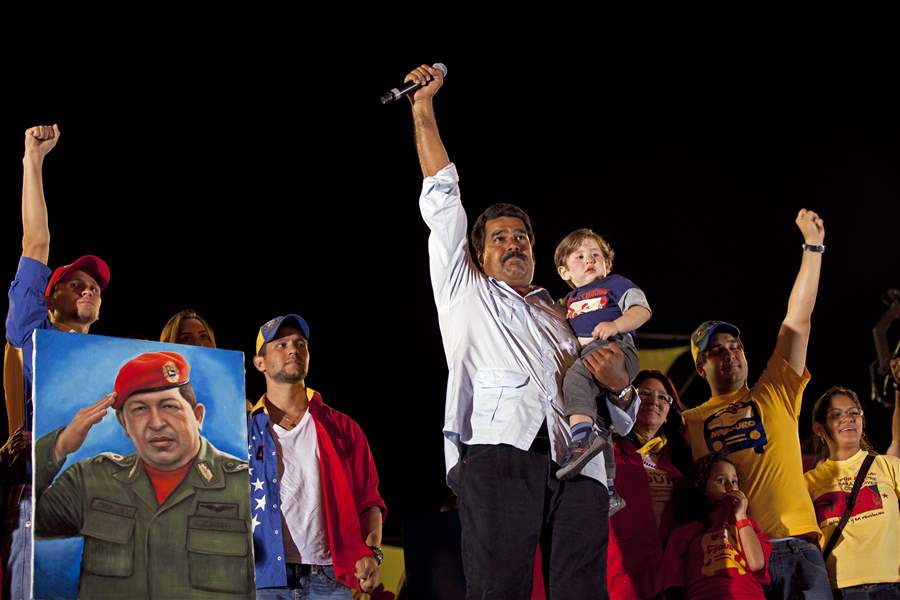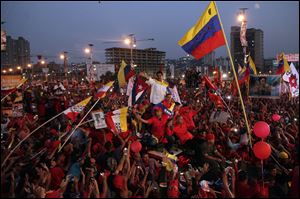
Chavez’s choice barely winselection to lead Venezuela
4/15/2013
Venezuela’s newly-elected president, Nicolas Maduro, acknowledges the crowd while holding his grandson during his closing campaign rally in Caracas.
ASSOCIATED PRESS

Venezuela’s newly-elected president, Nicolas Maduro, acknowledges the crowd while holding his grandson during his closing campaign rally in Caracas.
CARACAS — Ruling-party candidate Nicolas Maduro won Venezuela’s presidential election Sunday with 51 percent of votes, the electoral authority said, allowing him to carry forward the socialist policies of the late Hugo Chavez.
Mr. Maduro’s young challenger, Miranda state Gov. Henrique Capriles, garnered 49 percent in a tighter-than-expected vote. Mr. Capriles said he doesn’t accept the result announced by the country’s electoral council that gave victory to Mr. Maduro.
“We won’t recognize the results until all votes in the ballots are counted,” Mr. Capriles said. “We have a result that is different from the one announced.”
Hours earlier, a senior campaign aide for Mr. Capriles said the candidate was meeting with members of the country’s military high command, more than 4½ hours after polls closed.
The official, who spoke on condition of anonymity because he was not authorized to disclose the information, said he was not familiar with the content of the talks but Mr. Capriles’ camp has suggested privately it believed it was winning the vote count.
Hours earlier, Mr. Maduro’s campaign had strongly hinted at victory. Campaign chief Jorge Rodriguez smiled broadly during a news conference and summoned supporters to the presidential palace, where Mr. Chavez’s supporters gathered to celebrate the late president’s past victories. And he warned that Mr. Maduro’s camp would not allow the will of the people to be subverted.
Mr. Capriles and his campaign aides immediately lashed out at Mr. Rodriguez’s comments.
Ramon Guillermo Aveledo, a Capriles campaign coordinator, suggested the government was trying to steal the election.
“They know perfectly well what happened and so do we,” he said. “They are misleading their people and are trying to mislead the people of this country.”
A war of words erupted on Twitter.
Mr. Capriles suggested fraud was in the works, tweeting: “We alert the country and the world of the intent to change the will of the people!”

Nicolas Maduro, Hugo Chavez's hand-picked successor, greets supporters from the top of a vehicle as he arrives at Bolivar Avenue for his final campaign rally before Sunday's vote. Mr. Maduro won the election with 51 percent of the vote over his opponent Henrique Capriles.
But former Information Minister Andres Izarra tweeted, “To Miraflores! Long Live Chavez!”
Independent security analyst Rocio San Miguel tweeted that Interior Minister Nestor Reverol was also meeting with senior military commanders.
Bill Richardson, former New Mexico governor and longtime U.S. ambassador-at-large who came to witness the election, said both candidates assured him they would respect the vote’s outcome.
“I’m not here as an election observer, but I met with both candidates — Maduro, yesterday, and Capriles today. And I’m hopeful because both told me they would respect the rule of law and the will of the people,” Mr. Richardson said.
Mr. Maduro, 50, Mr. Chavez’s longtime foreign minister, pinned his hopes on the immense loyalty for his boss among millions of poor beneficiaries of government largesse and the powerful state apparatus Mr. Chavez consolidated.
Mr. Maduro’s campaign was a near-religious homage to the man he called “the redeemer of the Americas.” He blamed Venezuela’s myriad woes on vague plots by alleged saboteurs that the government never identified.
Mr. Capriles’ main campaign weapon was to emphasize “the incompetence of the state.” Millions of Venezuelans were lifted out of poverty under Mr. Chavez, but many also think his government not only squandered, but plundered, much of $1 trillion in oil revenues during his tenure.
Venezuelans are afflicted by chronic power outages, crumbling infrastructure, unfinished public works projects, double-digit inflation, food and medicine shortages, and rampant crime.
The nation has one of the world’s highest homicide and kidnapping rates.
“We can’t continue to believe in messiahs,” said Jose Romero, 48, an industrial engineer who voted for Mr. Capriles in Valencia. “This country has learned a lot and today we know that one person can’t fix everything.”
Voting lines seemed considerably lighter than in the October election that Mr. Chavez won, when more than 80 percent of the electorate turned out, although government officials said it was because of improved efficiency of the system.
After polls closed, moments of tension arose at some voting centers.
At Andres Bello High School in central Caracas, a band of about 100 Chavistas on motorcycles, many with faces covered, harassed opposition activists who wanted to witness the vote count to ensure no fraud occurred.
Some of the Chavistas tried to steal phones and cameras from people recording video of the event.
Motorcycle-riding Chavistas have on several occasions during the campaign beaten Capriles supporters in the capital, though none apparently seriously enough to require hospitalization.
The governing United Socialist Party of Venezuela deployed a well-worn get-out-the-vote machine spearheaded by loyal state employees.
It also enjoyed the backing of state media as part of its near-monopoly on institutional power.
Mr. Capriles’ camp said Chavista loyalists in the judiciary put them at a glaring disadvantage by slapping the campaign and broadcast media with fines and prosecutions that they called unwarranted.
Mr. Capriles, 40, is a state governor who lost to Mr. Chavez in October’s presidential election by a nearly 11-point margin, the best showing ever by a challenger to the longtime president.
At his campaign rallies, Mr. Capriles would read out a list of unfinished road, bridge, and rail projects. Then he asked people what goods were scarce on store shelves.
Mr. Capriles showed Mr. Maduro none of the respect he earlier accorded Mr. Chavez.
Mr. Maduro hit back hard, at one point calling Mr. Capriles’ backers “heirs of Hitler.” It was an odd accusation considering that Mr. Capriles is the grandson of Holocaust survivors from Poland.
The opposition contended Mr. Chavez looted the treasury last year to buy his re-election with government handouts. It also complained about the steady flow of cut-rate oil to Cuba, which Mr. Capriles said would end if he won.
Venezuela’s $30 billion fiscal deficit is equal to about 10 percent of the country’s gross domestic product.
Mr. Maduro, a former union activist and bus driver with close ties to Cuba’s leaders, constantly alleged Mr. Capriles conspired with the United States to destabilize Venezuela and even suggested Washington had infected Mr. Chavez with the cancer that killed him.
He focused his campaign message on his mentor: “I am Chavez. We are all Chavez.”
And he promised to expand anti-poverty programs.
The victor of the balloting faces no end of hard choices.
Many factories operate at half capacity because strict currency controls make it hard for them to pay for imported parts and materials.
Business leaders say some companies are near bankruptcy because they cannot extend lines of credit with foreign suppliers.
Mr. Chavez imposed currency controls a decade ago, trying to stem capital flight as his government expropriated large land parcels and dozens of businesses. Now, dollars sell on the black market at three times the official exchange rate and Mr. Maduro has had to devalue Venezuela’s currency, the bolivar, twice this year.